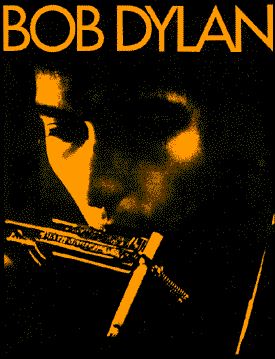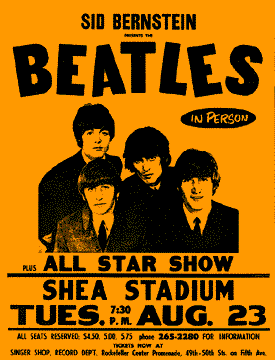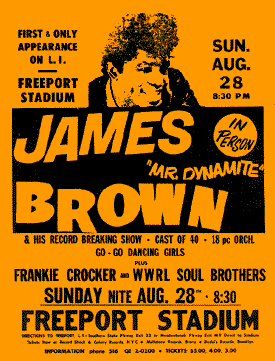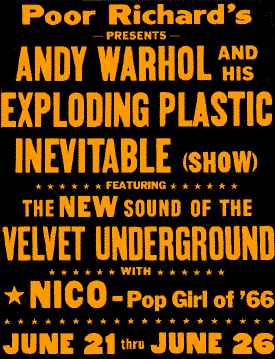| |
| |
ORPHEUS PLUGS IN
by Robert Shelton
The View from the Critic's Desk
|
|
| |
The age of space is moving us outward. The age of drugs is moving us inward. And the age of the new mass arts is moving us upward, inward, outward, and forward. In this era of exploration, there are many breeds of navigators, but few more daring than the poet-musicians who are leading our popular music in new directions.
Pop music, on the face of it, would seem a strange place to find genuine avant garde artistry. For years, the routinized banality of Tin Pan Alley has bred an overall feeling of contempt for the limits of a "Moon, June, Spoon" consciousness. But today, full-fledged poets are taking over from the commercial lyricists and catapulting into the plastic new expressions of pop music.
Increasingly, the place to find the new poetry is on a pop record. As the academicians continue to speak largely to themselves, the New Poets are talking to the mass audience through the vehicle of music. "The times, they are a-changin'", says Bob Dylan, and a chorus replies "Amen."
The poet-musician is just another facet of the new fluidity of lines among the arts which no longer casts the creator into one rigid occupation. Today the poet writes for both a little magazine and a rock 'n' roll band; the painter works with a hand-held camera as well as a brush; the cameraman is going to Nashville to record a tune; the rock 'n' roll star is also an author who illustrates his own books. The avant-garde pop musicpoets-artists are trying everything. Every form is open to them.
A rock 'n' roll dance in 1966 is not the vacuous congress of adolescent yahoos of ten years ago. More likely it is an impromptu festival of the arts -- combining music, poetry, dance, lights, and film. At the Avalon Ballroom in San Francisco, at an Andy Warhol show in New York's Dom, at Murray the K's Long Island airplane hangar -- the senses are besieged by the "total assault" of all that is happening. The melody insinuates itself; the poetry invades; the beat permeates; the dancing bodies gyrate; stroboscopic lights dance a jig on the ceiling; movie projectors fill the walls with living, pulsating murals. It's a new, total art form.
Perhaps the academicians should go to the dance to find out why the mass arts nucleating around popular music are in the epicenter of a creative cauldron. Perhaps the assistant professors of comparative lit. sit too long in their cloisters. Come out, Professor, where the music is loud and the lights are low, and where poetry is suitable for dancing.
Though the literati proclaim that Bob Dylan is no poet, the museum men say that Andy Warhol is no painter, the donors bestow no Oscars on Barbara Rubin -- the explorers just continue to explore. The new musicians are working in many forms; the new writers work in any form they can find to express themselves.
Where was pop music 20 years ago? Dinah Shore sang "Buttons and Bows." Helen Forrest sang "I've Heard that Song Before." Kay Kyser played "I've Got Spurs that Jingle Jangle Jingle" and "Ole Buttermilk Sky." The level of our pop music has changed profoundly in 20 years, no in five years, from pop art to juke-box poetry.
Today's music is talking about unvarnished reality, not about the fantasy that the commercial pop-song-writers were so deeply mired in. The songs of the early 1960's spoke out against militarism, hatemongers, phrasemongers, phoneys, hypocrisy, regimentation, injustice. They poked comical-satirical fun at conservatism and squareness. Now the 1966 trend is shifting toward a non-political, non-society oriented philosophy as the songs speak of alienation and anti-convention. Paradoxically, they are expressing an avantgarde, underground philosophy to a mass audience, deepening the thinking of masses of young people.
Who are some of these musician-poets? What do they look like and what do they sound like? What are they saying for themselves and for us?
It can be maintained that the voice that brought modern poetry to its largest audience is that of Bob Dylan, the young poet-musician from Hibbing, Minnesota. When, in 1961, he launched his professional performing career in the East, Dylan was to cause a revolution in the arts.
Though initially a rockabilly, or rock 'n' roll performer, Dylan quickly assimilated the entire folk scene. To the accompaniment of his own sparse guitar, oriented primarily to the works of Woody Guthrie, Dylan was to jolt the folk movement with the simple brilliance of his lyrics and the melodies he wrote or adapted from tradition. Though there had been an active song-writing movement in the city folk scene for years, Dylan's brilliance provided the impetus to make the movement flower.
|
|

| |
But the political orientation of the elders was not totally holding the younger people. With his famous song, "Mr. Tambourine Man," Dylan turned away from the socialprotest material of "Blowin in the Wind," "Masters of War," and "Hard Rain's A Gonna Fall" to the more personal statement of the artist racing the world alone, with no weapons but his own vision and his own thought.
Although possibly Poet Allen Ginsberg's influence had brought about this change, we cannot minimize the inner direction and dictates of Dylan, himself. Clearly, he felt a lack of stimulation and depth from the topical-song movement -- as he said, "Woody Guthrie was a genius, but he wrote on only one level." In early 1964, when the Beatles invasion caused the emergence of interest in rock n roll, Dylan was able to think of returning to an old musical love, only this time he was doubly armed with a prolific fluency in writing poetry.
Dylan has worked in many veins -- impish humor, cynical satire, moralistic protest, subjective fantasy, tender love songs. Now Macmillan schedules a first printing of 50,000 for his book "Tarantula" and the Atlantic _Monthly has bought prepublication rights.
Many of his lyrics read poorly without the dimension of music so vital to their total effect. Yet consider, for one example, this verse from his "Chimes Of Freedom":
""Far between sundown's finish an midnite's broken toll
We ducked inside the doorway, thunder crashing.
As majestic bells of bolts struck shadows in the sounds
Seeming to be the chimes of freedom flashing.
Flashing for the warriors whose strength is not to fight
Flashing for the refugees on the unarmed road of flight
An for each an ev-ry underdog soldier in the night
an' we gazed upon the chimes of freedom flashing...
...Tolling for the aching ones whose wounds cannot be nursed
For the countless confused, accused, misused, stung out ones an worse
an' for every hung up person in the whole wide universe
An we gazed upon the chimes of freedom flashing."*
A far cry from "Spurs that Jingle Jangle Jingle"?
Dylan has caused shoe clerks and factory hands to be on close terms with such relatively obscure lines as his anti-Philistine comments from "The Ballad of a Thin Man":
""Something is happening here,
But you don t know what it is,
Do you, Mr. Jones?
""You walk into the room
Like a camel and then you frown
You put your eyes in your pocket
And your nose on the ground
There ought to be a law
Against you comin around
You should be made To wear earphones."**
Summoning his thoughts out of Bob Dylan and a million other words he's heard, Eric Andersen, long-haired, intense, searching-eyed 22-year-old rambler, writes a song called "The Hustler" that hurls imprecations at phonies, lapel-pullers, on-the-make types:
""0 you can try to run me down
But you can t drive me underground
When you re not there I ll be around
To haunt you, I won t make a sound
To track you, I don t need a hound
You think you re lost, I got you found
You re surrounded though you think
That they can t see.
You said keep on the sunnyside
That life was just a rainbow ride
A silver-studded surfboard glide
On the wine of waves to keep you high
Don t hit the moon if you fly too wide
It ll bring you down below the tide
Where no one keeps their tears inside
The waters hid them if you cry
For in the waves there are no mysteries..."***
*Words and music by Bob Dylan ©, 1964 by M. Witmark & Sons. Used with permission.
** ©, 1966. M. Witmark & Sons. Used with permission.
*** ©, 1966. Deep Fork Music, Inc, Used with permission.
|
|

| |
Andersen is generally a romantic lyricist, finding joy in physical passion and not fearing to discuss it, in such songs as "Come to My Bedside." But he keeps his franchise as social critic in "The Hustler."
Then there are the five New York poets who have formed a hairy, vigorously "beat" group, The Fugs, whose reputation is roaring through the Underground like a Lexington Avenue Express. These Underground poet-laureates rely on the avant-garde's old weapon -- "Shock the bourgeoisie" -- but they also make trenchant social commentary. Led by poet Ed Sanders, the group might be considered Lenny Bruce's children, if any comparison to the past were accurate. One moment The Fugs are singing new settings to the poems of William Blake; the next they are advancing their own rock-satire-camp-outrage lyrics with such titles as "Frenzy," "Supergirl," "Dirty Old Man," "Group Grope," which deal with the sexual revolution in uncensored four-letter terms. "Slum Goddess," "I Couldn't Get High," and "Nothing" are fusillades against conservatism and squareness, while "Kill for Peace" is an anti-war song that ridicules some of the slogans we live by.
""Kill, kill, kill for peace -
Kill, kill, kill for peace -
Near or middle or very Far East,
Far or near or very middle east.
If you don't like a people or the way that they talk,
If you don't like their manners or the way that they walk,
If you don't kill them then, the Chinese will.
You don't want America to play second fiddle..."*
By their very name, the Fugs are a conscious affront to the square world. On the West Coast, another nouveau folk-rock group, The Mothers, are working in similar vineyards. Like most short-cut descriptions hastily applied to pop-music trends, the term "protest song" is obviously inadequate. It touches on the trend among folk singers of the early 1960 s, who were using music to speak out on social injustices from war to discrimination. "Protest music" may also be loosely applied to a current hit song, "I Am a Rock, " by moon-faced, boyish Paul Simon, of the popular duo, Simon & Garfunkel. The song speaks coruscatingly about alienation, and implicitly criticizes the forces leading to such detachment
""I build walls,
A fortress, steep and mighty,
That none may penetrate.
I have no need of friendship, friendship causes pain.
It's laughter and it's nothing I disdain.
I am a rock.
I am an island
I have my books
And my poetry to protect me.
I'm shielded in my armor
Hiding in my room, safe within my womb
I touch no one and no one touches me.
I am a rock.
I am an island.
And a rock feels no pain
And an island never cries."**
Allen Ginsberg has been a central pinion for at least a decade in linking music with poetry and with protest of one sort or another, if only protest against prevailing philosophical belief. In Jack Kerouac's "Dharma Bums,'' he was Alvah Goldbook, involved in the first poetry and jazz meetings in San Francisco.
Today Ginsberg is involved in the trend toward raga rock, in which classical raga music of India is coupled with American Negro-sired rhythm and blues. Sandy Bull was the first instrumentalist on the folk scene to become enchanted with rage music for Western instruments. Now the movement is national. Ginaberg, who begins and ends his poetry readings with Indian chants, is now teaching the chants to The Byrds, another young West Coast rock group, and new rage rock groups, such as The Seventh Suns, and The Lost, are springing up. This is still another indication that the young pop musicians today are traveling through the world with their ears wide open. Even The Beatles have become fascinated with the sitar, prime instrument of Indian music.
*"Kill for Peace," by Tuli Kupferberg. ©, 1965 by United International (ASCAP). Used with permission.
**© 1966, By Eclectic Music Co Used with permission
|
|

| |
In France, the tradition of the singing poet is even stronger than in the United States. with Charles Aznavour, Brasse, and Aufray leading examples. Throughout the world, the bards sing out. Intense, dark-haired Leonard Cohen, acclaimed by some as Canada's leading poet, ends his poetry readings with guitar in hand, singing in the style of the French-Canadian chansonnier. Bulat Okudzava, poet, novelist, writer, balladeer, has made a tremendous impact on the people of the Soviet Union, with his candid, antimilitaristic songs, though he is one of Russia's two best-known "unpersons," sharing this egregious distinction with Nikita Krushchev. A young English writer, Michael Thomas, writes songs for Judy Collins, and the Beatles' John Lennon, besides writing song lyrics, is a Literary Lion, roaring through the best-steller charts with his two books "In His Own Write" and "A Spaniard in the Works." In East Germanv, Wolf Bierman is playing gadfly to the Communists with his guitar as a weapon, though recent reports say the authorities have silenced him.
French master chansonnier, Jacques Brel, has strongly influenced Rod McKuen, lean, blond, sensitive West Coast singer-writer who is pouring out songs -- Some 700 to date on a wide range of subjects. Few people have written more touching explorations of the lonely than McKuen:
""So many old men sitting in the park
Waiting for the dawn to come and chase away the dark,
But the night never shakes the stars from out its hair
And the old men just sit there and sit there and sit there.
Each of us alone, apart.
Each of us alone.
Oh, the world we might have known
If we d found somethings to call our own.
A dandylion day perhaps
that fin'lly took us home.
Something that didn't go away,
Leaving us all alone..."*
Again in the United States' Phil Ochs, adorning his latest album jacket with poems by Mao Tse-tung, causes interest with his topical-political-satirical songs, and magazines invite him to write for them. In San Francisco, Underground Poet Michael McLure is studying the autoharp and writing poems for musical settings.
And then, the talented Richard Farina, killed in a motorcycle accident in May on his way home from an autographing party for his novel], "I ve Been Down So Long, It Looks Like Up to Me." In his songs, performed with his wife Mimi, Farina reflected on this "tangerine-plastic world," and "a tradition barely ours and hardly its own." His last work was in a mystical form of lyric-writing, but few of his songs had the impact or popularity of his critique of the slaying of four Negro girls in a Birmingham church by racists:
""On Birmingham Sunday a noise shook the ground.
And people all over the earth turned around.
For no one recalled a more cowardly sound.
And the choirs kept singing of Freedom.
The men in the forest, they once asked of me,
How many black berries grew in the Blue Sea.
And I asked them right back with a tear in my eye.
How many dark ships in the forest?..."**
In an article written for the mimeographed bulletin, "Crawdaddy," Farina succinctly summed up the status -- and influence -- of poetry and pop music today:
""...one could argue very easily that verse is never very far from song, that more people are listening to poetry at the moment than have in the history of mankind. And that more of them are probably turning over in the middle of their personal night, long after the poet has had his melodic say, wondering what they are doing, and, more to the point, just why."
*©, 1965, by In Music Catalog (ASCAP) Used with permission.
*©, 1964, By Ryerson Music Publishers, Inc. Used with permission.
© Section 4, Aspen Magazine Vol. 1, No. 4
|
|

|
|







